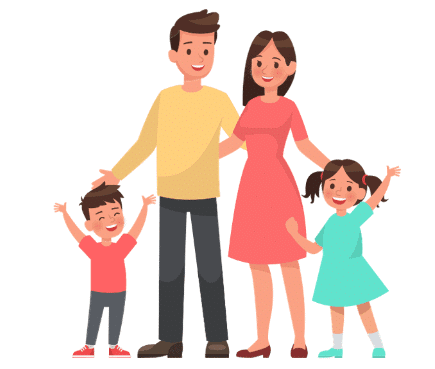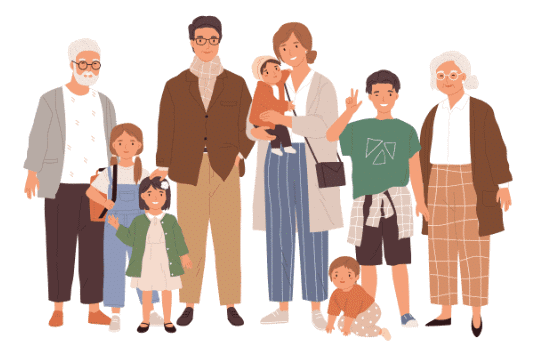Class 3 Exam > Class 3 Notes > EVS for Class 3 > Chapter Notes: Our First School
Our First School Chapter Notes | EVS for Class 3 PDF Download
| Table of contents |

|
| Family |

|
| What is Family? |

|
| Who are Family Members? |

|
| Family Bonds & Traditions |

|
| Why Family is Important? |

|
Family
- Our first school is actually our family!
- From the moment we're born, our family becomes our first teachers.
- They teach us all sorts of important things like how to talk, walk, eat, and behave.
- They also help us learn about values, beliefs, and social skills.
- So, even before we go to a formal school, our family is already teaching us so much about the world and how to navigate it.

What is Family?
- A family is a group of people who are connected to each other by blood, marriage, or adoption.
- They're the people who love and care for each other, support each other through good times and bad, and share a bond that's special and unique.
Question for Chapter Notes: Our First SchoolTry yourself: What is a family?View Solution
Who are Family Members?
Family members can include parents, siblings, grandparents, aunts, uncles, cousins, and even close friends who feel like family. They're the people we grow up with, learn from, and create memories with. Different Family members are as follows:
- Parents: They're usually our mom and dad. They take care of us, love us, and help us grow.
- Siblings: These are our brothers and sisters. They're like ready-made friends who we share our home and experiences with.
- Grandparents: They're our parents' parents. They pamper us, tell us stories, and give us lots of love.
- Aunts and Uncles: They're our parents' siblings. They're like extra parents who we can have fun with and go to for advice.
- Cousins: They're the children of our aunts and uncles. They're like friends who are also part of our family.

Family Bonds & Traditions
- Pet names are a special way to show love. For example, grandparents might be called "Dadi" or "Dada" for grandparents, and sometimes kids use cute names for younger siblings or cousins. These pet names make everyone feel loved and closer to each other.
- Family traditions are activities that families do regularly. For example, many families celebrate festivals like Diwali, Christmas, or Eid with special foods, decorations, and gifts. These traditions make festivals more fun and help everyone feel happy and excited to be together.
- Families also share similar habits and characteristics. For instance, some families may always eat dinner together at the table, or they may enjoy watching movies on weekends. These habits help families stay connected.
- In families, everyone has a job to do, and it's fun to help out! For example, one person might set the table for dinner, while another might clean up afterwards. When everyone helps, things get done faster and it's more fun! Working together makes the family happy.
Why Family is Important?
- Family is important because it gives us support and makes us feel we belong.
- It keeps us safe, teaches us, helps us grow socially, and keeps us healthy and happy.
The document Our First School Chapter Notes | EVS for Class 3 is a part of the Class 3 Course EVS for Class 3.
All you need of Class 3 at this link: Class 3
|
45 videos|182 docs|48 tests
|
FAQs on Our First School Chapter Notes - EVS for Class 3
| 1. What are some common family traditions that strengthen family bonds? |  |
Ans.Common family traditions include celebrating holidays together, having regular family meals, participating in family game nights, and creating rituals for special occasions such as birthdays and anniversaries. These traditions help to foster a sense of belonging and connection among family members.
| 2. How do family bonds affect children's development? |  |
Ans.Strong family bonds contribute positively to children's emotional and social development. They provide a sense of security, boost self-esteem, and help children develop important social skills. Children with supportive family relationships are often more resilient and better able to cope with challenges.
| 3. Why is family considered the first school for children? |  |
Ans.Family is considered the first school because it is where children first learn about values, communication, and social norms. Parents and caregivers teach children essential life skills, emotional intelligence, and how to interact with others, laying the foundation for their future education and relationships.
| 4. What role do grandparents play in family bonds and traditions? |  |
Ans.Grandparents often play a crucial role in family bonds by sharing wisdom, stories, and traditions from previous generations. They can provide emotional support, help care for grandchildren, and teach family history, which helps to strengthen the family's identity and sense of belonging.
| 5. How can families create new traditions that reflect their values? |  |
Ans.Families can create new traditions by identifying shared values and interests, such as volunteering together, starting a weekly movie night, or participating in cultural events. Regularly engaging in these activities helps solidify the family's identity and reinforces their commitment to their values.
Related Searches















